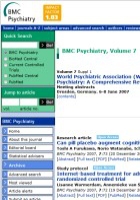Background
The Major Depression Inventory (MDI) is a new, brief, self-report measure for depression based on the DSM-system, which allows clinicians to assess the presence of a depressive disorder according to the DSM-IV, but also to assess the severity of the depressive symptoms.
Methods
We examined the sensitivity, specificity, and psychometric qualities of the MDI in a consecutive sample of 258 psychiatric outpatients. Of these patients, 120 had a mood disorder (70 major depression, 49 dysthymia). A total of 139 subjects had a comorbid axis-I diagnosis, and 91 subjects had a comorbid personality disorder.
Results
Crohnbach's alpha of the MDI was a satisfactory 0.89, and the correlation between the MDI and the depression subscale of the SCL-90 was 0.79 (p < .001). Subjects with major depressive disorder (MDD) had a significantly higher MDI score than subjects with anxiety disorders (but no MDD), dysthymias, bipolar, psychotic, other neurotic disorders, and subjects with relational problems. In ROC analysis we found that the area under the curve was 0.68 for the MDI. A good cut-off point for the MDI seems to be 26, with a sensitivity of 0.66, and a specificity of 0.63. The indication of the presence of MDD based on the MDI had a moderate agreement with the diagnosis made by a psychiatrist (kappa: 0.26).
Conclusion
The MDI is an attractive, brief depression inventory, which seems to be a reliable tool for assessing depression in psychiatric outpatients.
 Cuijpers P., Dekker J., Noteboom A. Smits N., Peen J. (2007) Sensitivity and specificity of the Major Depression Inventory in outpatients. BMC Psychiatry, 7:39
Cuijpers P., Dekker J., Noteboom A. Smits N., Peen J. (2007) Sensitivity and specificity of the Major Depression Inventory in outpatients. BMC Psychiatry, 7:39
